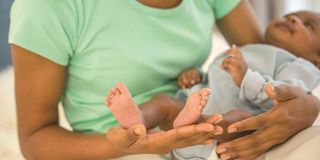Africa wins when we prioritise women’s health; here’s how

A mother and her newborn.
What you need to know:
- Funding cuts in East and Southern Africa threaten to reverse progress in sexual and reproductive health, risking increased HIV infections and maternal deaths.
- Investing in family planning yields significant economic benefits; Kenya gains Sh22 in productivity for every shilling spent.
Princess Chitsuro has transformed her life. Born with HIV, she only learned her status as a young adult. Overcome with shock and fear, she initially distanced herself from everyone—friends, community, even her own future.
But denial only lasts so long. When she became pregnant, Princess was unaware that she could prevent transmitting HIV to her unborn child. She learned that she could, after joining a mentorship programme for young mothers. There, she found peers – women who had walked the same path, who offered her guidance, compassion, and care. Thankfully, her baby does not have HIV.
There are thousands of stories like Princess’s in East and Southern Africa, thanks to family planning, reproductive health and HIV funding in the region.
Read more: Can women achieve equity in healthcare?
In 2024 alone, these services and commodities helped avert some 9.49 million unintended pregnancies, 3.38 million abortions, 19,150 maternal deaths (UNFPA supplies data) and 2.6 million HIV infections in children across the region. Namibia and Botswana, for example, recently received ‘Bronze’ and ‘Silver’ Tiers certifications for being on the path to eliminating vertical transmission of HIV from mother to child.
But the ending to these stories are under threat, with the funding shortfall crisis following reductions in foreign development and humanitarian assistance across the African continent – women and girls will suffer the most.
When funding falters, women suffer
Analysis from 2gether 4 SRHR, the joint United Nations regional program, indicates that funding cuts will have a significant impact on health equity; increase the barriers for vulnerable populations to access services; reverse the progress made in the HIV response; impact on early and unintended pregnancies; weaken health systems; and challenge the collection of data that enables stakeholders to monitor impact, improve programming, identify gaps, and hold governments accountable.
According to UNAidsS projections, if funding is not available to fill in the gap left by Pepfar funding cuts we can expect to see, globally, a 400 per cent increase in Aids-related deaths, 8.7 million new HIV adult infections, an additional 3.4 million orphans made vulnerable by HIV and 350,000 new HIV infections in children by 2029. Our region will bear witness to 75 per cent of these deaths and new infections. Put simply, funding cuts will roll back the hard-earned health and development gains in East and Southern Africa, and put governments at risk of achieving the targets of the 2030 Sustainable Development Goals.
Why we must invest in Sexual and Reproductive Health and Rights (SRHR)
Despite shifting priorities and shrinking budgets, investing in SRHR is the right thing to do—benefitting the individual, community, and society as a whole. New data indicates that in South Africa, the lifetime cost of failing to invest in SRHR is $33.7 billion, equating to 8.0 per cent of the nation’s annual GDP—exceeding its annual health and education budgets combined.
Conversely, universal access to contraception is cited as having one of the highest returns on investments amongst the targets of the Sustainable Development Goal. In Kenya, every shilling invested in scaling up family planning services yields Sh22 in productivity returns in a five-year time frame.
At the heart of the matter, investing in SRHR transforms a woman’s life – through improved maternal health, increased access to contraception and HIV services, and reduced gender-based violence, women can meaningfully participate in the workforce and in society, representing an investment for the future. For example, Princess is now paying it forward as a young mentor mother, helping other pregnant or breastfeeding women to access the support she once received.
This holistic approach is key. ‘Healthy beginnings, hopeful futures’. As we mark this year’s World Health Day, now is the time to increase new investments in sexual and reproductive health, and work strategically with national governments to do so. 2gether 4 SRHR is working across the region to support governments to unlock investments and financial opportunities for SRHR, determining alternative options for sustainable financing.
The program is working with regional economic communities such as the Southern African Development Community and East African Community to convene national dialogues with governments to increase domestic financing for health. As we reflect on World Health Day marked just two days ago, now is the time to scale up our partnerships and collaborations with governments, donors, civil society and others so that every woman in our region, like Princess and her baby, can survive and thrive..
The authors are Eastern and Southern Africa regional directors.




